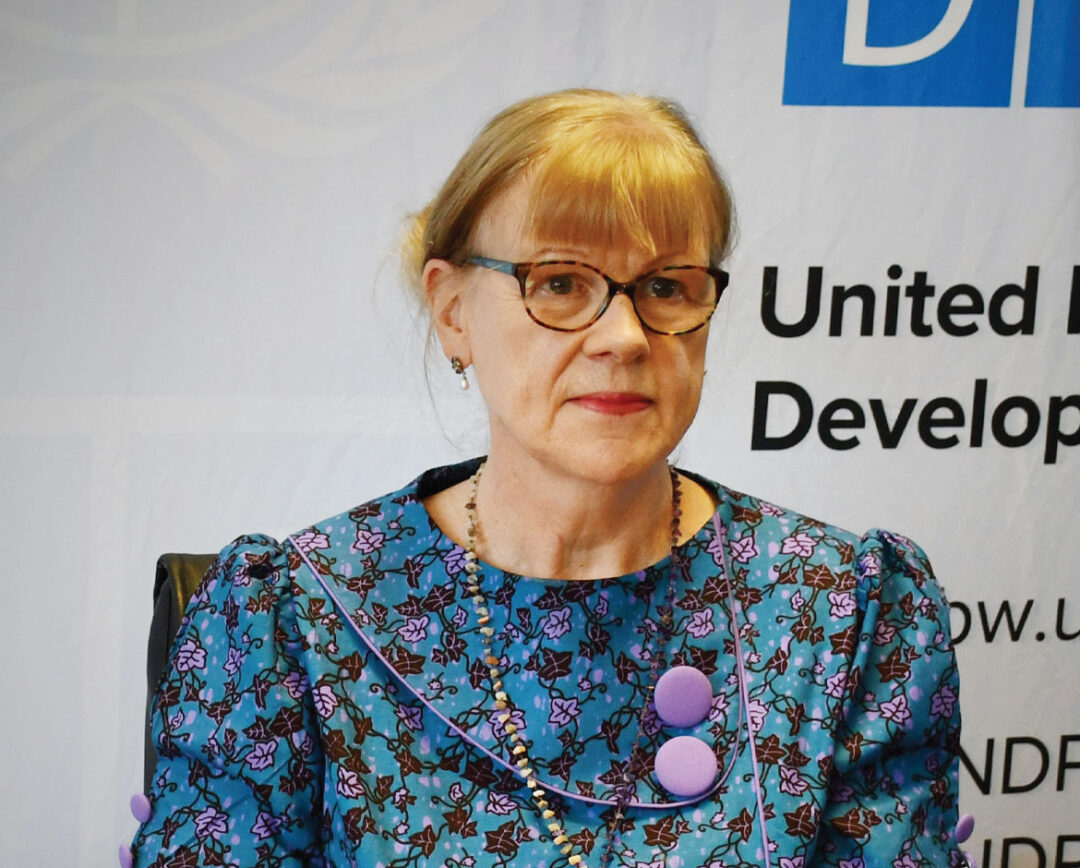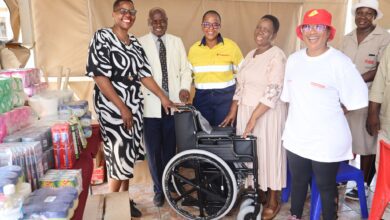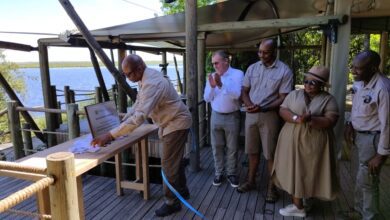Leaving a Mark – UNDP Botswana’s Jacinta Barrins
In 2017, Jacinta Barrins landed in Botswana as the new Botswana Resident Representative for United Nations Development Programme (UNDP). As UNDP Representative, Barrins took on a role to raise awareness and mobilise support for the Sustainable Development Goals, to help the communities around the world. Everyone can remember how, for the past five years, she walked the talk and also immersed herself in the culture and development of this country. Since this is the end of her tenure, Barrins has undoubtedly left her mark in Botswana.


With her colourful, locally designed African and German print dresses, one was sure to notice the Irish lady who always wore a smile. The dedication and commitment from Barrins have been evident since she set foot in the country. As the Resident Representative, there were two overall arching parts of her work which included working with and supporting the government to implement their plans such as the National Development Plan 11, etc. Secondly, Barrins had to advocate the government to implement sensitive areas which are often not prioritised. She was always in attendance at various events, travelled the country, met with leaders of communities, shared words of wisdom and was results-oriented. Since she started her journey in Botswana, Barrins expressed how exciting yet challenging her stay was as most development issues were quite complex.
For Barrins, her goal has always been to leverage the platform that UNDP gave her by making the necessary changes and developments. As a thought leader, at the helm of a powerful organisation such as the UNDP, she managed to address issues in the areas of poverty and inequality by supporting policies that facilitate job creation, economic growth and diversification, and the creation of a conducive business environment. This is evident in how active she was and hands-on when it came to launching programmes such as the Supplier Development Programme (SDP), bio-gas digesters, local government transformation projects, to mention a few.
“As a way of breaking down barriers, connecting with people, and making the strides to do developments and changes especially in the remote areas, Botswana through the UNDP has identified the goals to take part in and looked for opportunities that have been able to involve people and the government in the implementation of the United Nations’ Sustainable Development Goals (SDGs). The challenges we face, a global pandemic, a global economy, a global climate change crisis, mass migration and extreme poverty, social justice are unrelenting and interconnected, but they’re not unresolvable if Botswana is leading the way,” said Barrins.
She further explained that she has been priviledged to work with the government, various ministries, the private sector and non-governmental organisations during her stay. According to Barrins, the UNDP operates on five year plans so when she arrived, it had completed the initial country programme document and her job was to roll it out. She explained, “Within the shaping of this roll out plan, there are three big pillars that the UNDP supports which cover economic development, environmental issues and governance. When it comes to the local economy, UNDP started working with Ministry of Investment Trade and Industry (MITI) to develop an export-led programme, helped to analyse and assess the economic diversification programme then also helped MITI to develop a new one.”
In addition, UNDP worked with the Local Enterprise Authority (LEA) to develop an informal sector plan arising from the Covid-19 pandemic. This significant plan is aimed at reaching the age group of 18-35 years of youth who are trying to set up businesses and those who fall out of the net in the informal sector, as they contribute almost 6% to the Gross Domestic Product (GDP).
The Botswana Country Office further established a UNDP flagship programme, the Business Supplier Development Programme (SDP), aimed at capacity building of citizen-owned Small Medium Enterprises (SMEs). The SDP is modelled around the successful one implemented by UNDP around the world. The programme, in partnership with UNDP’s local partners, has an initial focus on the following sectors/supply chains; Mining, Infrastructure, Agro Processing, Health, Digital, Leather, Textiles andOther Manufacturing. Qualifying Suppliers undergo capacity development per requirements of the Buyers, enrolled on the SDP, to ready them for profitable, effective and sustainable supply. Local consultants are also trained to deliver this supplier development methodology (SDM).
Moreover, Barrins explained that UNDP also helps the government to measure poverty in a different way through the use of the Multidimensional Poverty Index (MPI), which involves about 10 indicators for every district. Through the Ministry of Local government, UNDP has managed to develop the social protection recovery plan from Covid-19 and implement it. UNDP has also completed the inequality study to try and understand what the drivers for inequality are in Botswana.
“Still on the economy, UNDP has continuously and closely worked with the private sector. Since 2017, we have been working with Business Botswana, to help them develop their five- year plan and in 2020, we helped them develop a recovery plan out of Covid-19 pandemic. As there are several sectors of the economy under Business Botswana, we have made it a point to work with each sector especially the energy sector in terms of promoting solar energy in Botswana. The feedback from stakeholders is that the aforementioned economic development highlights have been impactful instruments of implementation that the government is now using to shape economic development at community and district level especially now during this challenging period of a global pandemic,” added Barrins.
Moreover, Barrins and her team have been also focusing on the environmental impact issues like climate change. The UNDP has projects across the country in remote areas like Chobe district for wildlife management and in Ngamiland district is in terms of wasteland management, smart agriculture by removing acacia tree as it affects the soil and then developing charcoal industry. In Kgalagadi and Ghanzi areas, the UNDP programme is looking at the relationship between wildlife conflict and communities to use wildlife as an asset and an opportunity to benefit the community.
“As you know, around the world countries are focusing on alternative energy as coal and oil are considered harmful to the climate hence why the UNDP has a sustainable programme called the bio-gas digesters for households using cow, pig or chicken dung which is put through a carefully constructed bio-digester where the outcome is gas and fertilizer. This is an inexpensive alternative energy source especially in areas where the electricity grid cannot reach,” noted Barrins.
During her stay, Barrins also concentrated on governance in Botswana by developing an important human rights national plan, which is a first for the country. This plan will look at social, economic and political rights so that human rights can be used multi-dimensionally. UNDP has also supported and helped Botswana to develop a bill, policy and strategy plan for disability which is pending approval by the Parliament. Barrins expressed how this is a hot topic globally as the disabled have a right to opportunities like everyone else. In terms of justice, UNDP is working with Legal Aid Botswana to provide access to free legal counsel and justice for people in rural areas as they are the most vulnerable people in the communities. Since the pandemic started, there has been an increase in gender-based violence cases and this is why the UNDP has been working with government to develop a training programme for local Chiefs across the country as they are vital in dealing with this issue.
“On a lighter note, as much as Covid-19 has been negatively impactful, it has somewhat brought other positive opportunities of how people work as the UNDP is now supporting the government in digitalisation and put the government online via the smart team. In line with President Masisi’s agenda of resetting, there are high level consultants to working with the Ministry of local government to implement the transformation plan. This will include areas of decentralisation, digitalisation, social protection reform, the economic resilience reform and the reform of the Ministry. For me, this is one of the many milestones we have achieved thus far,” said Barrins.
Through the Ministry of Finance and Economic Development, UNDP has managed and continues to advocate for the SDGs to be implemented in Botswana. Barrins explained that the Ministry is responsible for coordinating the implementation of the SDGs throughout other Ministries so that they can lead in unbundling the complexities of coordination such as planning guidelines, implementation of the ‘leave no one behind’ approach, monitoring data, resource mobilisation and research needed in Botswana around SDGs.
In conclusion, Barrins said everyone should play their part and contribute to shaping the development of Botswana. She said, “Know that change is possible because oftentimes people think of change as a negative thing but any ship’s direction can be changed. Rome was not built in a day so change is possible, people need to believe in their abilities and power to bring about change through their voices and actions. People should make investments in partnerships and relationships to achieve goals and make necessary developments in the country. When it’s all said and done, I have enjoyed my stay in Botswana and reflecting on what has been done in the past five years has been fulfilling.”






